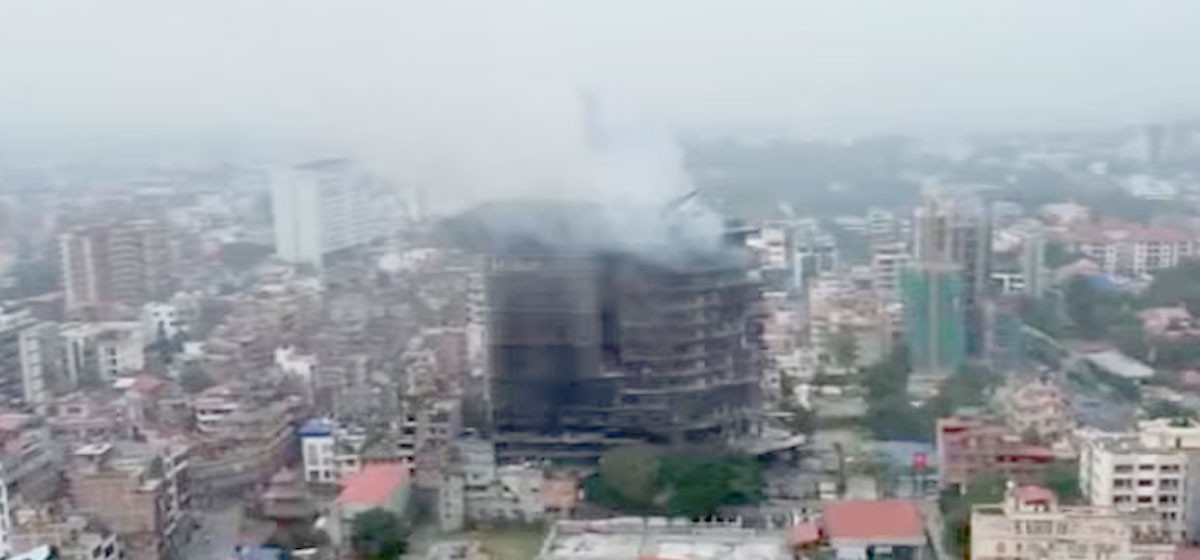KATHMANDU, Sept 13: The Gen-Z protests of September 8 and 9 not only caused significant human loss and physical damage but also negatively affected the country’s international image and, consequently, its tourism sector.
The peak tourist season was about to begin when the protests, followed by arson and violence, disrupted preparations. This has slowed down tourism, with several infrastructures damaged in the process.
As a result, some bookings by foreign tourists for the upcoming season have been canceled. The tourism sector, which had been severely hit by the earthquake, blockade, and the COVID-19 pandemic, was gradually regaining momentum. However, the latest setbacks have again shaken the industry.
Despite this, experts and stakeholders remain hopeful, noting that the current situation is not as severe as past disasters.
Tourism setback from protests: Peace first, promotion later, sa...

Economist Dr. Samir Khatiwada said that despite the damage to some tourism infrastructure, the sector still holds immense potential. He noted that although some tourists might be discouraged due to problems at Tribhuvan International Airport—the main entry point for international visitors—the government should proactively promote Nepal’s tourism image abroad.
Likewise, Nepal Tourism Board (NTB) Chief Executive Officer (CEO) Deepak Raj Joshi shared that a draft plan has been prepared in consultation with leading organizations in the sector to ensure effective tourism revival, and it will be made public soon. “Tourism will definitely revive. Based on past experience and with the support of international organizations associated with tourism, Nepal’s tourism will recover quickly,” Joshi said.
According to him, there are currently around 15,000 foreign tourists in Nepal. Most are at their destinations, while some are preparing to return home after completing their tours. He emphasized that priority has been given to ensuring the safety and comfort of tourists currently in Nepal so that no negative perceptions are formed. He also said the NTB has initiated a study of the damage caused to hotels and tourism infrastructure during the Gen-Z demonstrations.
Meanwhile, Hotel Association Nepal (HAN) Chair Binayak Shah stressed the need for all stakeholders to unite and accelerate the process of revival. “As the tourist season is about to begin, it is important to send a positive message from Nepal,” he said. “The tourism sector has revived quickly even after past disasters.”
He added that an environment must be created both to safely send tourists to their destinations within Nepal and to facilitate the return of those departing. “Tourism is an important sector that can bring economic prosperity to the country and should be prioritized,” he said.
General Secretary of the Pacific Asia Travel Association (PATA) Nepal Chapter, Narendra Dev Bhatta, also expressed confidence that Nepal’s tourism would recover soon. “The adverse situation created during the tourist season has had a negative impact, but let’s hope that normalcy will return quickly and the tourism sector will recover,” he said.
The Mountaineering Association of Nepal and the Trekking Agencies’ Association of Nepal (TAAN) issued a joint statement, emphasizing that all efforts should be made to revive the tourism sector. They appealed for the creation of a tourism-friendly environment and the maintenance of law and order in the country.
A preliminary study by HAN shows that about two dozen hotels suffered major damage during the Gen-Z protests. Hotels in Kathmandu Valley, Pokhara, Butwal, Bhairahawa, Jhapa, Biratnagar, Dhangadhi, Mahottari, and Dang Tulsipur were vandalized, set on fire, and looted, with both domestic and international brands affected.
The Hilton Hotel in Kathmandu alone is estimated to have incurred losses of more than Rs 8 billion. Initial estimates suggest that the tourism sector suffered more than Rs 25 billion in economic losses during just two days of violence sparked by the Gen-Z protests against corruption and poor governance.
RSS/CB Adhikari


































